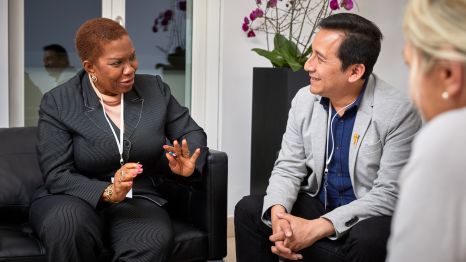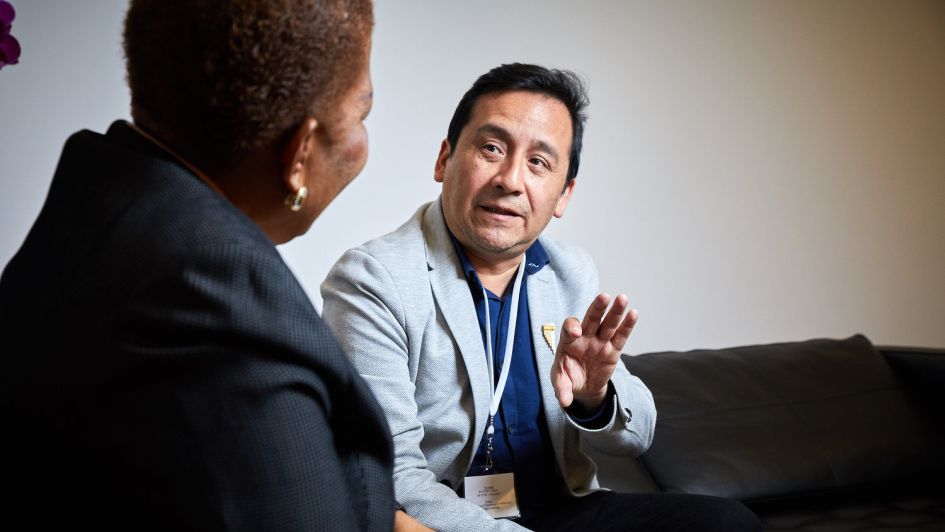
»Scientific education opens up prospects for people and helps create a stable society.«
Making progress together
In November 2017, the foundations “Haus der kleinen Forscher” (Little Scientists’ House) and Siemens Stiftung brought together more than 100 experts from 28 countries on the “International Dialogue on STEM” in Berlin to discuss the opportunities and challenges of STEM education worldwide. Uchenna Udeani, Professor of Science Education at the University of Lagos, Nigeria, and Hugo Flores, Director of the Center for Pre-university Education at the Universidad Peruana Cayetano Heredia, Peru, explain why their countries’ futures begin with small children.
Señor Flores, after two days of dialog with scientists from five continents, what new findings can you take back with you to Peru?
Flores: First, it was important for me to learn that we in Peru are not working on this issue in isolation. People from many countries have the same problems. It feels better when you make progress together. Just as important, I believe, is the realization that the time has come to share our knowledge. And that we must not keep secrets, but instead form a global scientific team. That was a key experience. I would even go as far to say it was a revelation!
How did that realization come about?
Flores: I filled an entire notebook. What I found important were the workshops, which were preceded by short talks to provide guidance and inspiration by experts on individual topics. I felt that to be very useful and I’ll introduce that in Lima. It’s an effective method to ensure the discussion doesn’t become frayed.
What workshops did you feel were particularly effective and exemplary?
Flores: I found the one on e-learning exciting. We have big gaps in this regard in Peru, despite the topic being so important! The problem in Peru is that we don’t have access to the Internet everywhere. In addition, most teachers are over the age of 50 and don’t know the digital world any more than their pupils. What’s more: It’s difficult for them to leave their comfort zone. They’ve worked the same way for 25 years. Computers are also expensive.
Professor Udeani, do you face similar problems?
Udeani: We not only lack access to the Internet, but also have problems with the power supply. Electricity isn’t available everywhere in Nigeria and when it is, it’s expensive.

One thing you have in common in Nigeria and Peru is that well-trained teachers are vital for the future of your countries. What are you taking back from Berlin in that regard?
Flores: The fact that we have to accompany teachers intensively after their training. When they have difficulties in everyday school life, they need support – which can be in the form of webinars or exchanges through WhatsApp. Teachers must not feel that they’re being left to fend for themselves. Although they have a good level of expertise, they usually aren’t able to motivate pupils. Chalk and talk is still often the customary method.
What language do teachers use for lessons in Peru and Nigeria?
Flores: The official language in Peru is Spanish and it’s taught at schools. However, there are also around 150 dialects and other languages. That’s why a workshop with the title “STEM and language” was interesting for me. A fundamental insight from that was that science education helps language development, especially in preschools and elementary schools.
Udeani: I can top that: We have 450 languages in Nigeria. The 71,000 students on the campus of our university in Lagos alone speak hundreds of languages. I, for example, come from the south and my native language is Igbo. But I teach only in English, the academic language.
Señor Flores, you are head of the pre-university of the private Cayetano Heredia University, the most prestigious institution for scientific research in Peru. What does “pre” mean here?
Flores: I deal with everything preceding a course of study. Our center specializes in preparing students for the university’s entrance examination. We do that for children as young as four.
Does that mean you prepare children who are just four years of age for the university by giving them a science education?
Flores: That’s precisely what we have to do. We in Peru need people who think critically and have scientific knowledge. Peru has around 5,000 researchers. But we need 50,000.
Udeani: I share that view. Early childhood education is important and I’m taking that back with me from this conference in Berlin. And not only starting from elementary school, but before that. That means from the age of two, when children learn to speak and so can also grasp interconnections. Subjects like hygiene are vital – such as the need to wash your hands or not throw refuse away so as not to pollute the environment.
Flores: The skills that the sciences impart are useful for every other vocation and your whole life. Small children like investigating, discussing and searching for solutions.
Udeani: Absolutely! We can even prevent terrorism by means of scientific thinking.
Physics and math against Boko Haram? Explain that, please!
When people have future prospects early on, that stabilizes society. That stops them turning to fanaticism. But Boko Haram is just one of our problems. We in Nigeria also have to contend with the Monkeypox virus, the Ebola virus and Lassa fever, all of which are life-threatening epidemics. Simply washing your hands correctly helps against these problems. Children learn that through a STEM education! They also learn how their own body works. And it always goes one step further – with Experimento, they learn how to discuss and make decisions responsibility. They learn democracy.
Are some of the problems in the five continents the participants came from similar?
Flores: Yes. We Latinos were among ourselves to begin with, but the structure of the workshops meant that the ice was soon broken and I spoke at length with a participant from Thailand and later with visitors from Kenya and South Africa. In the end, everyone was talking with everyone else. By the way, it was also the first time I’d spoken with people from Chile, despite the fact that our two countries are neighbors. We all have the same problems.
STEM has now transformed into STEAM, with the added “A” standing for arts. What do you feel about that?
Flores: Why not? For us, the “A” represents our cultural heritage. When we mix plants to create dyes and use them to color alpaca wool – that has something to do with our culture. Or the same when we make tea, a drug or cream from a plant. Then culture is added to the sciences.
Udeani: I view that pragmatically. “A” is equivalent to creativity and we need that in Nigeria to survive! We often have 90 children of different ages in one class. In a roofless schoolhouse. Perhaps it’s only a tree that provides shade. It’s not easy to ensure good teaching under such deprived conditions. Therefore, there’s nothing better than carrying our experiments.
Such as with the educational program Experimento?
Udeani: Yes, it’s a blessing for us. The children blossom. In our society, they otherwise don’t have any say, aren’t allowed to ask questions or protest and aren’t worth much. In the classroom they remain quiet and wait for what the teacher says. Experimento changes that. Which is good.
What are you taking back with you from the conference?
Udeani: The way we examine students at our university is wrong. The tests are all about reproducing what you’ve committed to memory. I’d like us to teach differently. In a more lively way. So that the children see their classroom as a playground. I’ll work on that when I get back. Pupils should be allowed to ask questions. A year ago, we started using Experimento at eleven different schools.
What has the feedback been like?
Udeani: Exciting and encouraging. The teachers are enthusiastic and are able to help themselves if they run out of something. I recently saw how they replaced a reflector from the Experimento kit. They went to a scrap merchant and broke the glass out of some headlights. Behind the bulb, there’s aluminum that provides a silvery reflection and so is suitable for our experiments. Our main objective now is to reach people in the north of our country. They’ve hardly had an opportunity to enjoy an education up until now. So there’s still a lot to be done. That’s why I’d like to see the issue of gender tackled at the next international dialog in 2019.
November 2017


